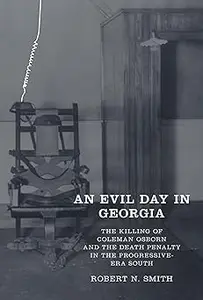
Free Download Robert Neil Smith, "An Evil Day in Georgia: The Killing of Coleman Osborn and the Death Penalty in the Progressive-Era South"
English | ISBN: 1621900940 | 2015 | 264 pages | PDF | 1447 KB
On the night of August 5, 1927, someone shot and killed Coleman Osborn, a store owner in
Chatsworth, Georgia, in his place of business. Police and neighbors found only circumstantial
traces of the murderer: tire tracks, boot prints, shell casings, and five dollars in cash near
Osborn's body. That day, three individuals-James Hugh Moss, a black family man locally
renowned for his baseball skills; Clifford Thompson, Moss's white friend who grew up in the
Smoky Mountains; and Eula Mae Thompson, Clifford's wife and a woman with a troubling history
of failed marriages and minor run-ins with the law-left Etowah, Tennessee, unknowingly
on a collision course with Deep South justice.
In chilling detail, Robert N. Smith examines the circumstantial evidence and deeply flawed
judicial process that led to death sentences for Moss and the Thompsons. Moving hastily in the
wake of the crime, investigators determined from the outset that the Tennessee trio, well known
as bootleggers, were the culprits. Moss and Clifford Thompson were tried and convicted within a
month of the murder. Eula Mae was tried separately from the other two defendants in February
1928, and her sentence brought her notoriety and celebrity status. On the night of her husband's
execution, she recanted her original story and would change it repeatedly in the following years.
As reporters from Atlanta and across Georgia descended on Murray County to cover the trials
and convictions, the public perception of Eula Mae changed from that of cold-blooded murderer
to victim-one worthy of certain benefits that suited her status as a white woman. Eula Mae
Thompson's death sentence was commuted in 1928, thanks in part to numerous press interviews
and staged photos. She was released in 1936 but would not stay out of trouble for long.
Read more
